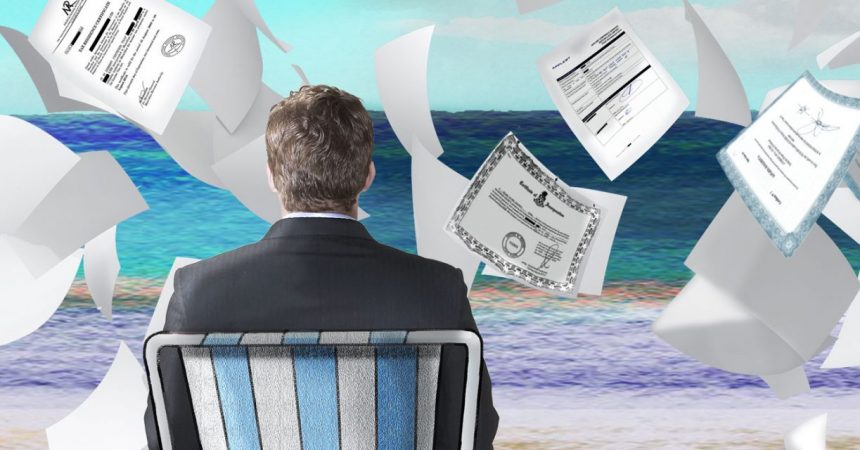When confronted by the news that the European Parliament was sending a delegation to investigate Malta’s anti-money laundering rules, Prime Minister Joseph Muscat said “I invite them to come over to see what a fantastic country we are.” But the Paradise Papers have already shown just how fantastic Malta is before the delegation has even set foot in our country.
Paradise Papers cast a dark shadow on Malta’s economic miracle and raises the question: are we thriving because we are looting?
The breakdown of the rule of law following the Panama Papers expositions has cast an even darker shadow, attracting more attention to our financial services industry.
The failure of Joseph Muscat to sack minister Konrad Mizzi and his Chief of Staff Keith Schembri, both of whom opened Panama companies three days after the 2013 general election, has cast the country in a bad light.
So has the failure of the police to act on FIAU reports, extracts of which published before the general election indicate irregularities which should have at least been investigated.
The latest revelation that the Chairman of the Malta Financial Services Authority – which is meant to regulate the sector – has interests in a Russian mining company has already attracted the attention of French newspaper Le Monde.
This bad press could have been avoided if the authorities had taken action back in 2012 when Joseph Bannister’s interests in an investment fund in the Cayman Islands were exposed by Labour MP Evarist Bartolo. Bannister was the same person responsible for issuing a licence for the infamous Pilatus Bank.
To add insult to injury the Paradise Papers reveal that Henley & Partners, the company entrusted with selling Maltese passports and which contractually binds Muscat to promote the scheme in other countries, had expressed interest in setting up asset protection trusts in the Cook Islands allegedly to thwart attempts by creditors for restitution.
The fact that members of government, regulators and their business connections are involved in the nefarious world of offshore companies raises questions on our country’s commitment to address tax justice issues on the international stage.
But while these institutional failures and dark collusions have aggravated the situation, the problems predate the current situation and addressing Malta’s reputational problem goes beyond partisan considerations. Bono, Shakira and the sons of Turkey’s Prime Minister Binali Yildirim set up their offshore structures in Malta under the previous administration.
While workers in other countries have borne the brunt of austerity, the Maltese have never had it so good, shielded by an economic system which partly relies on enticing shell companies to Malta by offering a favourable fiscal regime, in addition to a growing dependence on gaming and construction.
All this is taking place in an international scenario where tax justice is becoming a major issue as hard-pressed working people find it intolerable that tax monies are siphoned away in secretive tax havens or in countries which attract companies bent on minimising their tax exposure.
No wonder that a scheme whereby Maltese companies can purchase a yacht and lease it to a third party, allowing them to pay VAT at a substantially reduced rate, is attracting the international headlines. Such schemes jar with a world where working people have seen expenditure on essential public services in their countries slashed.
It is true that Malta is not a secretive destination since company ownership is public. Neither is Malta alone in offering fiscal incentives to companies. Luxembourg, the Netherlands and the US state of Delaware are to different degrees in the same league.
Still something has gone terribly wrong. Over the years Malta has also attracted shady characters, including politically exposed politicians from countries ranging from India, the Ukraine and Azeri kleptocrats as can be seen in the latest revelations. This seems to fit the picture of Malta having sold its sovereignty to dirty money as denounced by Green MEP Sven Geigold.
Ultimately Malta needs both a short-term and a long-term strategy to recover its reputation. In the short term it has to strengthen its institutions. But nothing short of the immediate resignation of those mentioned in the Panama Papers and the Paradise Papers from office will heal this wound.
Moreover it must be ensured that our financial service regime is not undermined by the infiltration of shady characters, politicians and criminal organisations. This also demands a strong moral leadership which the country presently lacks. For how can the government enforce fiscal morality when members of the same government were setting up their own offshore structures?
Paradise Papers exposes the need to find ways to utilise Malta’s expertise and human resources in the financial services sector in a more ethical way, attracting companies which come here because we enjoy a good reputation and not because we are disreputable.
Ultimately, Malta cannot live off the proceeds of piracy. Loot may be a source of short-term gain but the damage done to our reputation is permanent. We may be a fantastic country but a little bit of normality and sobriety is what we need most right now. Malta needs to send a strong message that it wants to clean up its act. As a start the Prime Minster should do what he failed to do after the Panama Papers exposed the offshore interests of his most trusted men.












